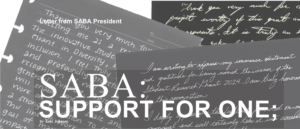Kansas ABA

By Kelley Harrison
KansABA’s mission is to (a) advance the science and practice of behavior analysis, as well as its education and training; (b) address issues relevant to the science, practice, education, and training in behavior analysis; (c) maintain disciplinary, professional, and ethical standards in the science, practice, education, and training in behavior analysis; and (d) recruit and enhance interest in behavior analysis throughout the State of Kansas and the Kansas City metropolitan area — Clay, Jackson, and Platte counties.
Governance
KansABA is governed by an Executive Committee that consists of a president: Kelley Harrison; a full member representative: Marren Leon-Barajas; an adjunct representative: Allyson Bell, and a student representative: Ky Kanaman. The Council is assisted by a secretary: Stacha Leslie; and a treasurer: Brittany Mitchelson Vaughn. In addition, KansABA has a Legislative Affairs Committee: Nicole Kanaman, chair; Legislative Liaison: Lisa Popelka & Sara Diaz de Villegas; an IT Committee: Matt Laske, chair; a Professional Development committee: Christie Stiehl & Megan Schmidt, chair; and a historian: Ed Morris. KansABA is excited to announce the following individuals were elected for incoming positions in 2022: Student member representative-elect: Lisa Ambrosek. Finally, KansABA would like to thank the following individuals who finished their terms of service in 2022: Professional Development committee: Kelley Harrison, chair.
Membership
KansABA has membership categories for:
Full Members: for individuals who reside in Kansas or the Kansas City metropolitan area and meet the requirements for Full membership at ABAI; Adjunct Members: for individuals who express an interest in the science or practice of behavior analysis or its education and training but do not meet criteria for other members categories; Student Members: for full-time students undergraduate or graduate academic degree program, certification program, internship, or resident program in the state of Kansas relevant to a career in behavior analysis and meet the student member requirements for ABAI; and
Lifetime Member: for individuals who provide considerable support for KansABA for above the required amount (lifetime members receive free membership and conference registration indefinitely).
Membership includes registration at the annual
April KansABA conference, which in turn includes admission to the conference’s Career and Education Fair, snacks and drinks throughout the conference, lunch, and an evening reception.
The membership year is conference to conference.
Conferences & Workshops
In 2022, we hosted our annual conference in person. Our conference’s theme was “Individual, Social, and Cultural Humility in Behavior Analysis.” Featured presenters included Shahla Ala’i-Rosales (University of North Texas), “The Liability of Self-Fullness”; Traci M. Cihon (University of North Texas), “Reflections on Teaching Behavior Analysis: Adjusting Our Scientific Lens in the Search for Humility”; Megan Miller (Do Better Collective), “Commitment to Effective and Humane Behavior-Analytic Service Delivery”; Malika N. Pritchett (University of Kansas), “Magnificence: Envisioning Full Dignity and Humanity ”; and Tyra P. Sellers (TP Sellers, LLC), “Culturally Responsive Supervision: What it is and Why it Should be one of Your Top Priorities.” We also held a business meeting, a Behaviorists for Social Responsibility SIG meeting, and a student poster session during the annual conference. Finally, we presented the postponed 2021 awards in person during this annual conference. This included four KansABA Distinguished Service Awards to Brett Gelino, Molly Pomeroy, Tyler C. Ré, and Allison S. Tetreault as well as one award for Outstanding Contributions to Behavior Analysis in Kansas: Juniper Garden’s Children’s Project.
In 2022, workshops continued throughout the course of the year. Workshops were held virtually for the first half of the year and in person for the second half of the year. The first workshop’s theme was “Delivering and Billing ABA Services: Essential Information for the Interested Practitioner” and was presented by Michele Silcox and Rebecca Womack. The second workshop’s theme was “The LGBTQ+ Community and Me: Queering Cultural Competence in Behavior Analysis” and was presented by Sarah Campau and Daniel Conine.
In 2023, we offered all workshops virtually and offered a hybrid experience at our annual conference. This change was in response to feedback provided by KansABA members that virtual workshops reduce barriers to attendance. Our first workshop’s theme was “Enhancing the Maintenance and Generalization of Staff’s Implementation of Healthy Behavioral Practices” and was presented by Nicole Kanaman.
Our annual conference theme was “Clinical Services Across the Lifespan: From Research to Practice.” Featured presenters included Dorothea Lerman (University of Houston, Clear Lake), “Current Research and Practice on Improving Job-Related Social and Problem-Solving Skills”; Jon Baker (Western Michigan University), “Promoting Successful Aging Through the Lifespan for Individuals with Autism Spectrum Disorder and Intellectual and Developmental Disabilities”; Katrina Ostmeyer (Beyond the Individual, LLC), “A Guide Through the Maze: Meeting Clinical Needs of Diverse Populations in Behaviorally-Oriented Private Practice”; Byron Wine (The Faison Center & University of Virginia), “Decreasing Employee Injuries in Human Services”; and Ilene Schwartz (University of Washington), “Project DATA 25 Years Later: What we Have Learned from a Quality of Life Influenced EIBI Program.” We also held a business meeting, a Behaviorists for Social Responsibility SIG meeting, and a student poster session during the annual conference. Both workshops and the annual conference provide our members with professional development opportunities, networking opportunities, and general, supervision, and ethic continuing education credits. Upcoming workshop and annual conference information can be found on KansABA’s website.
Special Interest Groups
KansABA’s members have a range of interests in teaching, research, service, and practice. To support them, KansABA encourages the development of special interest groups (SIGs). In this, KansABA will (a) assist them with recruitment, promotion, and dissemination; (b) publish SIG news and announcements on the KansABA website and in its conference program; (c) host SIG business meetings at the KansABA conferences; (d) co-sponsor continuing education events; and (e) maintain links between the SIGs and KansABA’s websites. KansABA currently has one SIG called “Behaviorists for Social Responsibility” (BFSR). Their mission is to promote and advance the application of the science of behavior to address social issues, particularly those with social justice, human rights, and environmental implications. All are welcome to join the SIG. Benefits of membership include professional development, network opportunities, research and service opportunities, access to resources, and topics
of interest. This year, the BFSR continued regular meetings and advocacy efforts. Most notably, this group disseminated an official position on the use of contingent electric skin shock (CESS). The BFSR worked closely with the KansABA Executive Council in creating this position. However, both entities published separate position statements. You can find BFSR’s official statement on KansABA’s Facebook page.
Legislation and Licensure
Our Legislation Committee continues to monitor and inform KansABA members of matters related to licensure requirements and related information through the quarterly KansABA newsletter and through out website Legislation page. This year, there were no changes with respect to Kansas or Missouri licensure. However, the committee completed two notable initiatives.
First, the legislation committee formed a working relationship with the Kansas Grassroots ABA group. Together, these teams are identifying ways to better reach and support individuals across the state of Kansas. Their current initiatives include identifying and disseminating resources to help practitioners secure funding for services in the state of Kansas, bringing practitioners from across the state (and especially in rural areas) together for networking and support opportunities through virtual quarterly meetings, and working with state legislators to increase funding opportunities for individuals with diagnoses other than autism and for adults with disabilities. Second, the legislative committee in conjunction with the KansABA Executive Council disseminated an official position on the use of contingent electric skin shock (CESS). The KansABA Executive Council worked closely with the BFSR in creating this position.
However, both entities published separate position statements. You can find the KansABA Executive Council’s official statement on KansABA’s Facebook page.
KansABA Web Site
Our Website Committee chair, Matt Laske, updated our website again this year. Please visit us at www.Kansaba.org. In fact, if you type “KansABA” into Google’s search engine, you will see that KansABA has the first five listings. We will continue to update and expand the site as we continueto grow.
Initiatives in 2022–2023
KansABA hopes to continue to grow as a professional organization and as a valuable resource for practicing and aspiring behavior analysts in the state of Kansas. As such, we have several initiatives this year. This includes (1) providing hybrid and virtual events to better reach and support individuals across the state of Kansas, (2) updating membership categories to better represent practitioners at all levels of the profession, and (3) creating a new membership category to represent stakeholders in the field of behavior analysis who do not currently practice behavior analysis as a professional.


